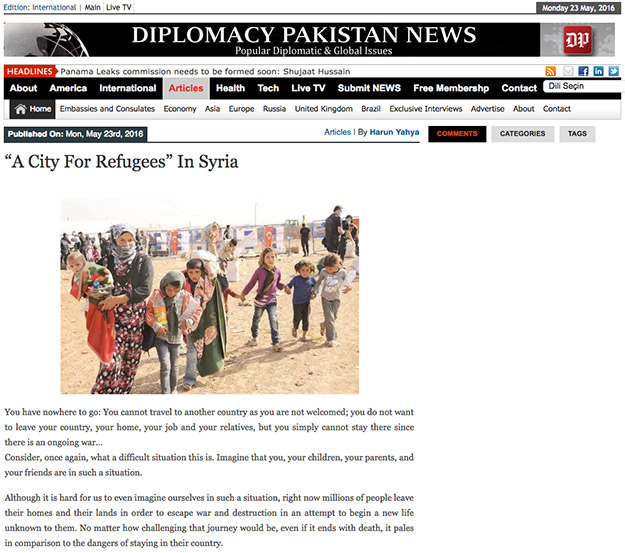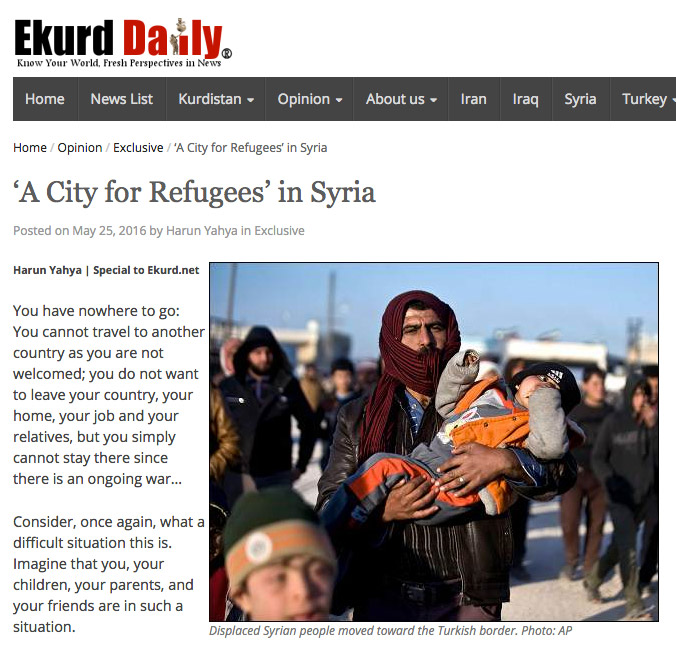
You have nowhere to go: You cannot travel to another country as you are not welcomed; you do not want to leave your country, your home, your job and your relatives, but you simply cannot stay there since there is an ongoing war…
Consider, once again, what a difficult situation this is. Imagine that you, your children, your parents, and your friends are in such a situation.
Although it is hard for us to even imagine ourselves in such a situation, right now millions of people leave their homes and their lands in order to escape war and destruction in an attempt to begin a new life unknown to them. No matter how challenging that journey would be, even if it ends with death, it pales in comparison to the dangers of staying in their country.
The lives of refugees have now been turned literally upside down. Those countries, like Turkey, that strive to make it somewhat easier for them and welcome them as refugees do so by making great sacrifices yet despite all of these efforts, the solution to the problem still does not seem to be on the horizon. The real solution is to put an end to the civil war immediately and make peace prevail in Syria once again. However, there is another method that can quickly be implemented until the settlement of peace: It could be made possible for them to lead their lives in safety in their own country with the establishment of buffer zones, safe cities for refugees within the lands of Syria.
Turkish President Recep Tayyip Erdogan has offered this solution to the leaders of many Western countries for several years now. Highlighting the fact that Turkey is a country proficient in construction and is willing to establish a city in the north of Syria for refugees, Mr. Erdogan stated that there are two indispensable requirements to achieve that:
1. A region free from terrorism
2. A no-fly zone
The negotiations between the European Union and Turkey on the migration of refugees to Europe were launched in June 2014. During these negotiations, among other things, Turkey also demanded from the European Union “to support the buffer zone that would be established in Syria.” Indeed, in the course of President Erdogan’s visit to Brussels on October 4th-6th 2015, the European Council President Donald Tusk said, “The European Union is ready to take up all issues with Turkey, so we also discussed a possible buffer zone in “Syria.”
Another important technicality is to integrate the United Nations and NATO in the steps taken about this matter. Turkish government officials, particularly Turkish Prime Minister Ahmet Davutoglu, firmly believe that the borders of such a buffer zone should be declared by the United Nations and NATO. It is believed that the involvement of the UN and NATO in the issue will ensure the international legitimacy necessary for the region.
The establishment of a buffer zone has been officially demanded by the people of Syria, particularly the Syrian Turkmen Assembly, for a long time. All in all, such a zone will not be a region divided from Syria, but a secured region within the lands of Syria. This zone will be established nearly 60 kilometers from the Turkish border, with another 10 km declared as “no-pass” secure zone; thus, anyone trespassing this buffer zone of 10 km would be discovered and detained immediately.
The second phase, following the establishment of this buffer zone, will be to build a modern and sheltered city for refugees in the region. Thus, both Syrians who are downtrodden within Syria and those who attempt to seek asylum in other countries can be transferred to this city. In fact, an important development that will facilitate the implementation of this project took place recently: Following the partial truce agreement made by the United States and Russia, Russia made a new move and began to withdraw a substantial part of its military forces from Syria. Therefore, the moment has become convenient to establish a buffer zone and build a city for refugees in northern Syria.
As a matter of course, this project of a refugee city would not be of a permanent nature, but a temporary one so the Syrian citizens living in this city would be able to return to their homes once the civil war in Syria ends.
The first thing to do in order to ensure the safety of this city for refugees is to establish a no-fly zone and a region free from terrorism. Moreover, the implementation of a meticulous security structure to ensure that the refugees would not be affected by the ongoing civil strife seems imperative. The UN might undertake the establishment of such a secure structure or an international task force might be assigned to that end. As it will be remembered, such international task forces have carried out their missions successfully against tribal attacks in Afghanistan and in conducting counter-piracy operations in the Gulf of Aden and in the waters off the coast of Somalia.
In addition to all these, a variety of international non-governmental organizations may carry out effective activities in establishing and catering for this city for refugees, under the leadership of the UN. Presently, a total of 113 non-governmental organizations, accredited by the Syrian government as of 2014, are active within the borders of Syria. However, these organizations are not all that effective due to the insecure situation in the country. Under the security umbrella of the UN and an international task force, these organizations can accomplish great achievements in this refugee city. In this way, large numbers of Syrian citizens that will be placed in this refugee city can be provided with safety, food and health assistance, education and clothing.
Another important point that should be considered is to make sure that these cities built for refugees have clean, and modern structures. Under the guarantee of the UN and an international task force, aid campaigns might be organized in many countries of the world to ensure this. By means of these campaigns, both financial and in-kind aid obtained can be smoothly transferred to this city for refugees.
In the case that the project succeeds, a second and a third city for refugees – with conditions similar to the first one – can be built in a nearby region. Such efforts will not only let these inoffensive, downtrodden people crushed under the weight of war for years breathe a sigh of relief, but also serve as a precedent for the reconstruction of the Syrian cities destroyed during the civil war.
Adnan Oktar's piece in Diplomacy Pakistan & EKurd Daily:
http://www.diplomacypakistan.com/articles/a-city-for-refugees-in-syria/
http://ekurd.net/city-for-refugees-syria-2016-05-25



